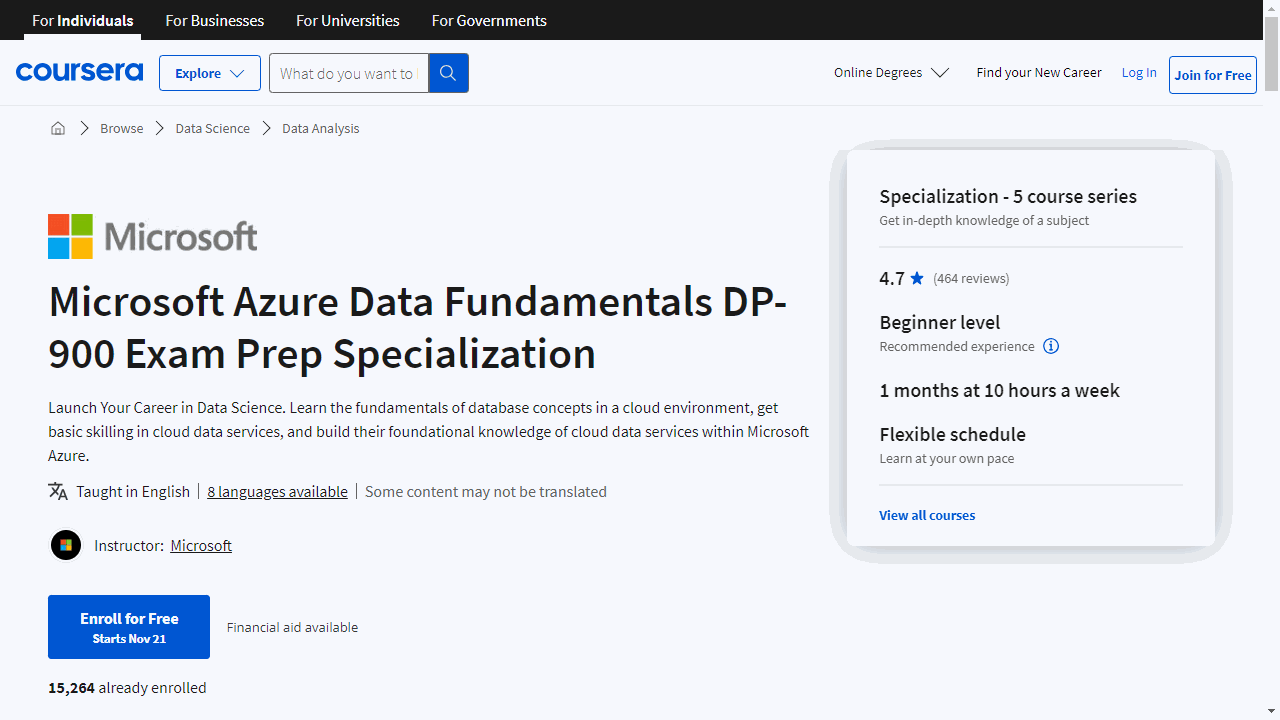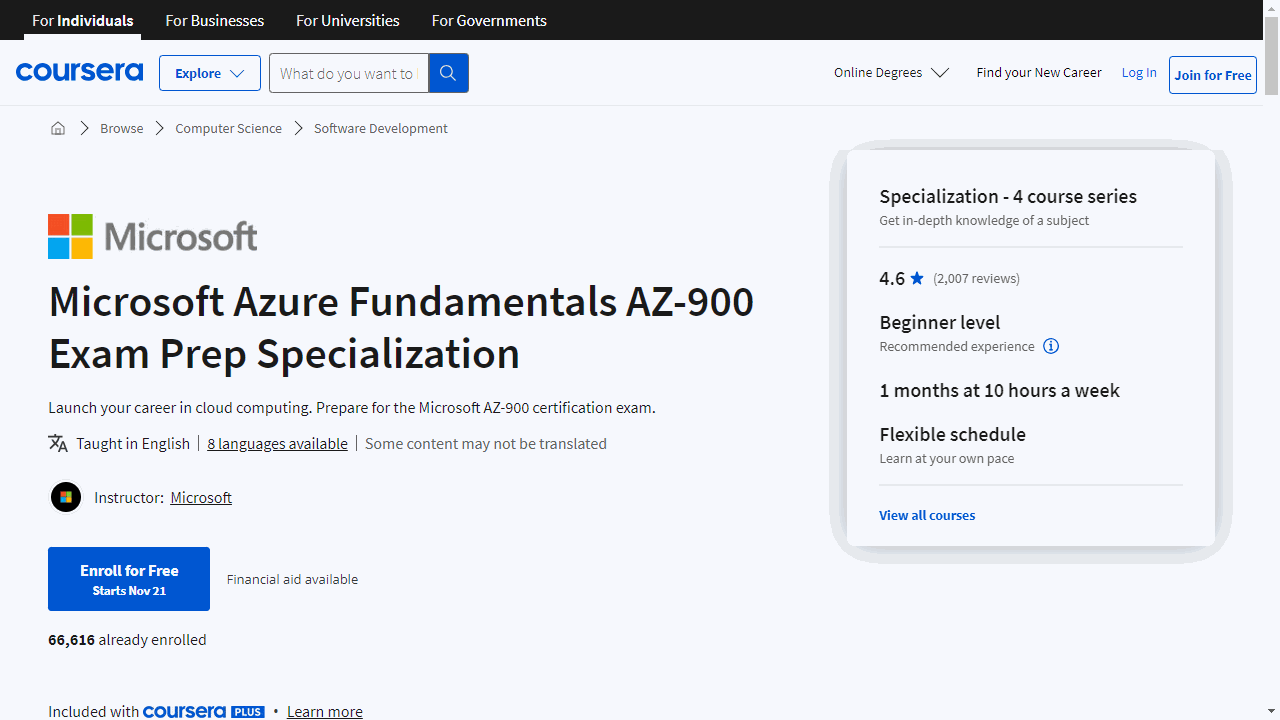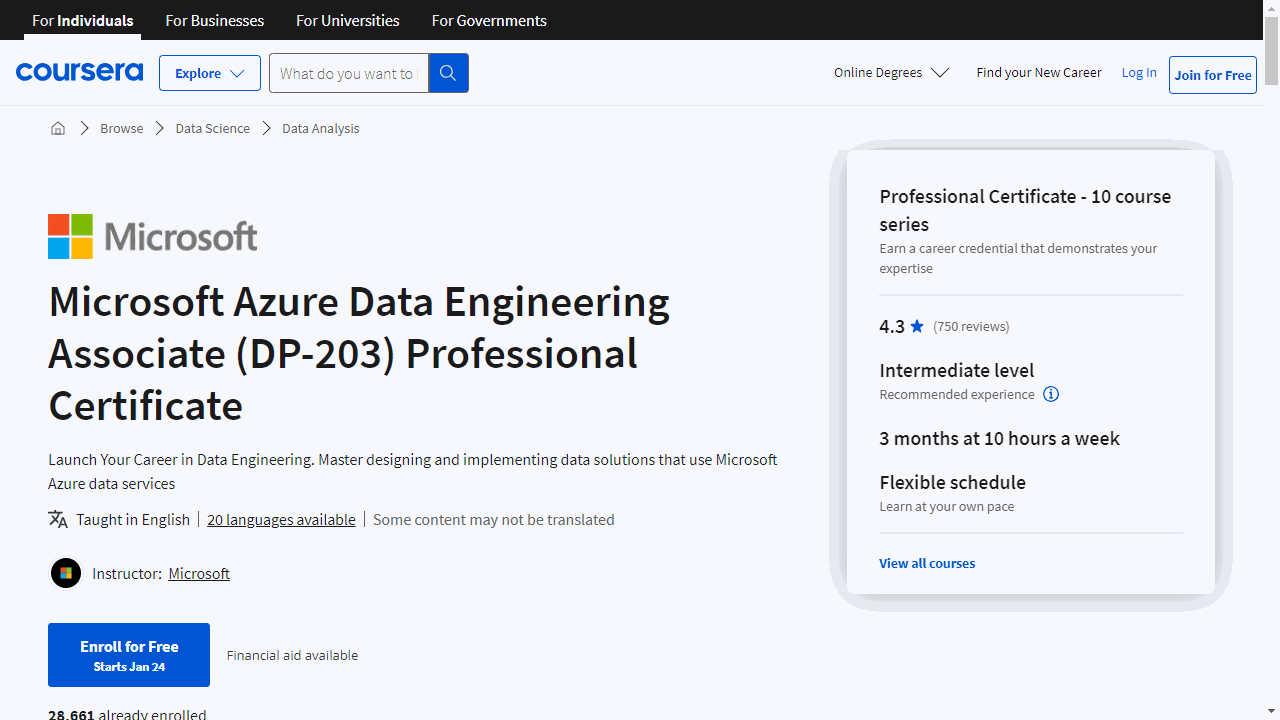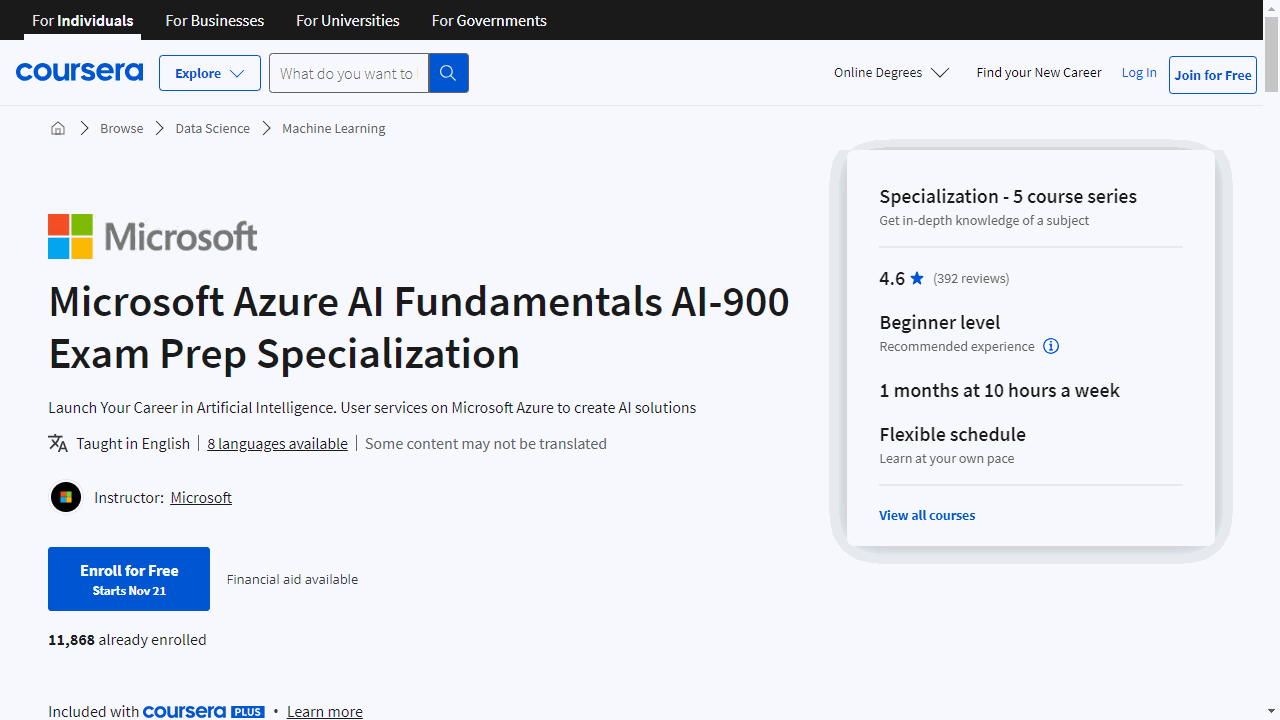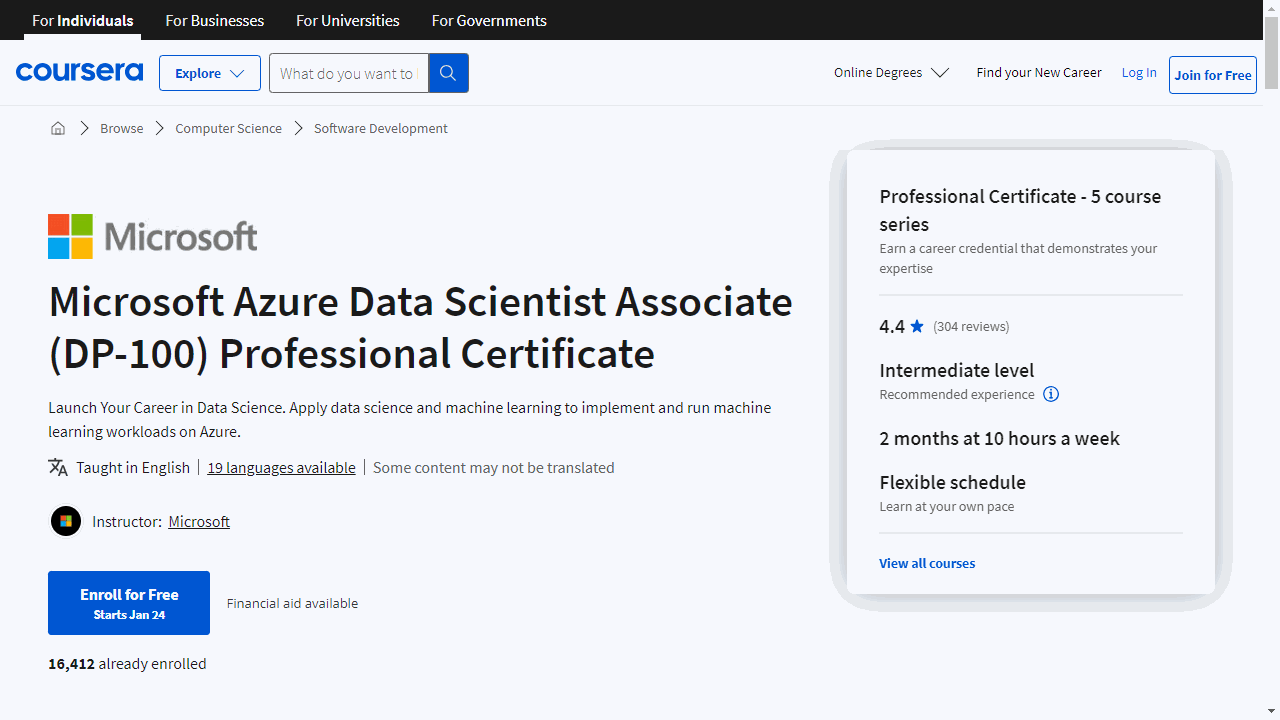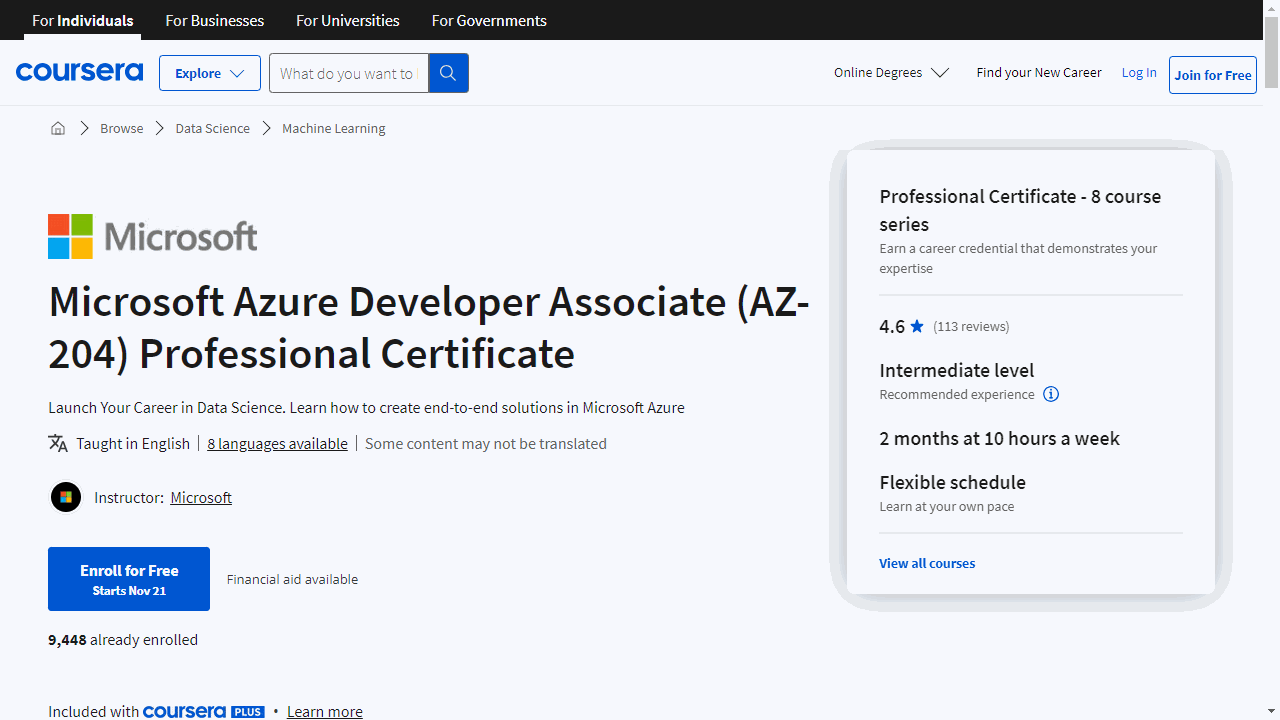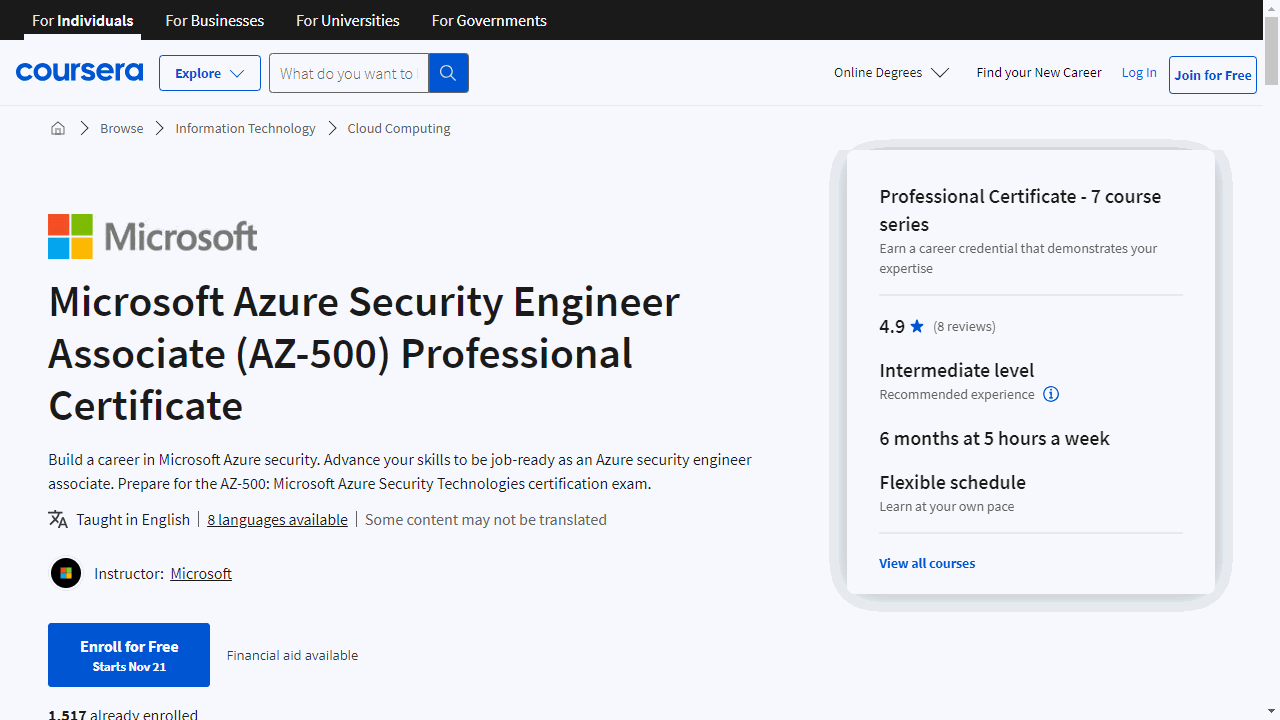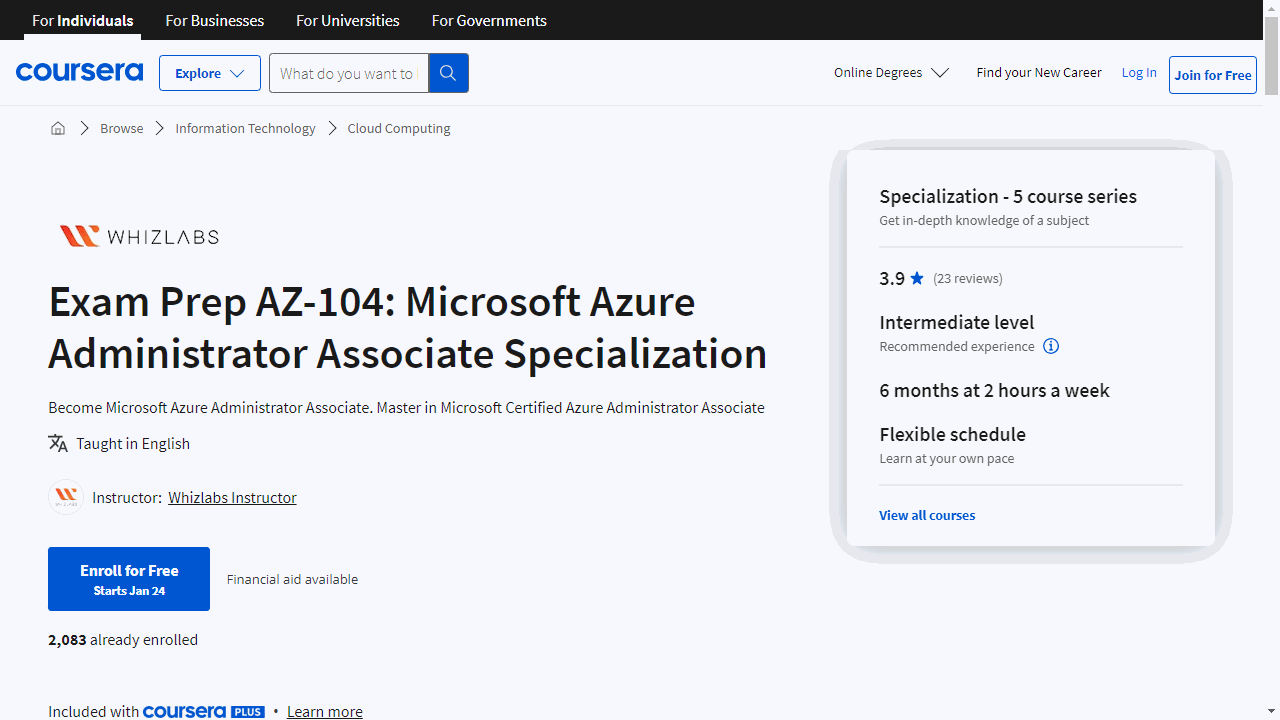Finding the right Azure course on Coursera can feel like searching for a needle in a haystack.
There are so many options, it’s hard to know where to start!
You want something comprehensive, engaging, and taught by experts, but you also want to make sure it fits your learning style and goals.
We’ve combed through the best Azure courses on Coursera and narrowed it down to our top picks.
For the best Azure course overall, we recommend the Microsoft Azure Fundamentals AZ-900 Exam Prep Specialization.
This specialization is perfect for beginners who want to build a strong foundation in Azure, covering core services, management tools, and security solutions.
With its hands-on exercises and practical approach, it’s a great way to learn the fundamentals of cloud computing and get ready for your Azure career.
But if this isn’t quite right for you, we have plenty of other options.
Keep reading for more recommendations, including courses for data engineering, AI and machine learning, developers, and cybersecurity, as well as specific courses for various Azure certifications.
Best Overall Azure Course On Coursera
Microsoft Azure Fundamentals AZ-900 Exam Prep Specialization
The “Microsoft Azure Fundamentals AZ-900 Exam Prep Specialization” on Coursera is a robust starting point tailored for individuals like you seeking to understand and leverage cloud computing.
The specialization kicks off with “Introduction to Microsoft Azure Cloud Services,” a course that lays the foundation.
It simplifies cloud computing concepts and introduces Azure’s core services.
You’ll learn how these services can be applied to various business scenarios without the need for coding expertise.
The course includes hands-on exercises using Azure’s sandbox, allowing you to experiment at no additional cost.
As you progress to “Microsoft Azure Management Tools and Security Solutions,” the focus shifts to the operational side of Azure.
Here, you’ll explore the suite of management tools that streamline deployments and maintain the health of your applications.
Security is also a cornerstone of this course, where you’ll learn to safeguard your Azure environment against potential threats and vulnerabilities, ensuring your data remains protected.
In “Microsoft Azure Services and Lifecycles,” the curriculum delves into the strategic aspects of cloud governance and compliance.
You’ll gain insights into managing access, strategizing costs, and understanding the implications of Azure’s service-level agreements on your projects.
This course equips you with the knowledge to make informed decisions about cloud expenses and design considerations.
The final course, “Preparing for the AZ-900 Microsoft Azure Fundamentals Exam,” is designed to consolidate your learning.
It offers a series of practice exams that mirror the AZ-900 exam format, ensuring you’re well-prepared for the certification.
You’ll also receive guidance on the Microsoft certification pathway, helping you plan your next career steps.
Each course is beginner-friendly, requiring only basic computer literacy and a grasp of general technology concepts.
Familiarity with Microsoft products like Dynamics 365 and Office 365 is helpful but not mandatory.
This specialization stands out for its comprehensive coverage of Azure fundamentals and its practical approach to learning.
It’s not just about passing an exam; it’s about gaining a solid understanding of Azure that you can apply in real-world scenarios.
Best Azure Courses for Data Engineering On Coursera
Microsoft Azure Data Fundamentals DP-900 Exam Prep Specialization
The specialization begins with “Explore Core Data Concepts in Microsoft Azure,” where you’ll establish a strong base in database concepts within a cloud environment.
This course simplifies the intricate world of data, breaking down relational and non-relational databases, big data, and analytics.
It’s not just about theory; you’ll also learn about the various data roles and responsibilities, setting the stage for practical application in Azure.
Moving on, “Microsoft Azure SQL” hones in on relational databases.
Here, you’ll explore how to use SQL for querying and maintaining data.
The course demystifies different SQL dialects and provides insights into Azure’s relational data services, making it a valuable resource for IT professionals aiming to enhance their database management skills.
If you are interested in the versatility of data storage, “Microsoft Azure Cosmos DB” shifts the focus to non-relational data.
You’ll gain clarity on managing and deploying NoSQL databases within Azure, broadening your understanding of the data landscape and how it applies to modern business needs.
In “Modern Data Warehouse Analytics in Microsoft Azure,” you’ll delve into the tools and processes for constructing robust data analytics solutions.
This course covers Azure Synapse Analytics, Azure Databricks, and Azure HDInsight, offering a practical approach to data processing and analytics that’s crucial for today’s data-driven decision-making.
Lastly, “Preparing for DP-900: Microsoft Azure Data Fundamentals Exam” is the capstone of the specialization.
It’s designed to consolidate your knowledge and ensure you’re well-prepared for the certification exam.
Through practice tests and strategic exam preparation, you’ll be positioned to not only pass the DP-900 exam but to do so with confidence.
Each course in the specialization is accessible to those with basic computer skills and a keen interest in data.
Prior experience with data in spreadsheets or charts can be beneficial but isn’t mandatory.
Microsoft Azure Data Engineering Associate (DP-203) Professional Certificate
This set of 10 courses is your roadmap to mastering Azure data services and acing the DP-203 certification exam.
Kick off with “Microsoft Azure for Data Engineering,” where you’ll explore cloud data platforms and learn to select the right Azure technologies for various business needs.
You’ll also compare cloud solutions to traditional on-premises setups.
“Data Storage in Microsoft Azure” will guide you through Azure’s storage solutions.
You’ll get hands-on experience creating Storage Accounts and learn to secure and optimize data storage and processing.
In “Data Integration with Microsoft Azure Data Factory,” you’ll tackle data pipeline creation and management, a critical skill for handling data at scale.
“Introduction to Microsoft Azure Synapse Analytics” introduces you to the versatile analytics service, Azure Synapse Analytics.
You’ll navigate its components and use Azure Synapse Studio for building comprehensive data solutions.
Deepen your knowledge with “Data Warehousing with Microsoft Azure Synapse Analytics,” focusing on modern data warehouse construction and query performance optimization within Azure Synapse Analytics.
For big data enthusiasts, “Data Engineering with MS Azure Synapse Apache Spark Pools” reveals how to enhance big-data analytics with in-memory cluster computing using Azure Synapse Apache Spark Pools.
“Operational Analytics with Microsoft Azure Synapse Analytics” shows you how to analyze operational data in real-time using Azure Synapse Link with Azure Cosmos DB, employing hybrid transactional and analytical processing.
“Microsoft Azure Databricks for Data Engineering” lets you leverage Apache Spark and Azure Databricks for handling large-scale data engineering tasks, including working with Delta Lake and understanding Spark Cluster architecture.
“Azure Data Lake Storage Gen2 and Data Streaming Solution” covers efficient big data processing with Azure Data Lake Storage and streaming analytics with Azure Stream Analytics, complete with security and data upload strategies.
Lastly, “Prepare for DP-203: Data Engineering on Microsoft Azure Exam” is your final prep, offering a comprehensive review and practice exam to ensure you’re exam-ready.
Best Azure Courses for AI and Machine Learning On Coursera
Microsoft Azure AI Fundamentals AI-900 Exam Prep Specialization
This comprehensive suite of courses is tailored for anyone looking to grasp the essentials of AI, whether you’re starting from scratch or aiming to refine your expertise.
The specialization begins with “Artificial Intelligence on Microsoft Azure,” a course that lays the foundation for your AI education.
You’ll explore key AI concepts such as machine learning and computer vision, and understand how AI can be applied to solve real-world problems.
It’s not just about the technology; you’ll also delve into the ethics of AI, learning to navigate the challenges of creating responsible AI solutions.
Progressing to “Microsoft Azure Machine Learning,” you’ll discover the power of Azure Machine Learning Studio.
This course demystifies the process of building machine learning models, offering a no-code approach that’s perfect for beginners.
You’ll learn about the iterative nature of training models and the different types of machine learning, all without the need for deep programming knowledge.
In “Computer Vision in Microsoft Azure,” the focus shifts to image analysis.
You’ll use Azure’s pre-trained models to process images, a skill that’s increasingly sought after as industries seek to enhance their products with AI capabilities.
This course equips you with the tools to create applications that can interpret visual data, a cornerstone of modern AI.
“Natural Language Processing in Microsoft Azure” introduces you to the intricacies of text analytics and language services.
From sentiment analysis to language detection, you’ll gain hands-on experience with Azure’s text analytics service, learning to build applications that can interact with users in natural language.
The final course, “Preparing for AI-900: Microsoft Azure AI Fundamentals exam,” is designed to consolidate your knowledge and prepare you for the certification exam.
It offers a thorough review of the key concepts covered in the previous courses, complete with practice exams to test your readiness.
This specialization is accessible to learners of all backgrounds, with or without a technical foundation.
While some familiarity with programming can be beneficial, the primary requirements are basic computer literacy and English proficiency.
By the end of this specialization, you’ll not only be prepared to take the AI-900 exam but also possess a solid understanding of AI principles and Microsoft Azure’s AI services.
This knowledge can serve as a stepping stone to further certifications and a career in the burgeoning field of AI.
Microsoft Azure Data Scientist Associate (DP-100) Professional Certificate
This comprehensive program guides you through the essentials of machine learning to the intricacies of cloud-scale solutions with Azure.
Kick off with “Create Machine Learning Models in Microsoft Azure,” where you’ll grasp machine learning fundamentals and practice with tools like scikit-learn, TensorFlow, and PyTorch.
This course is ideal if you have a grasp of machine learning or a solid math foundation.
You’ll learn to set up data science environments on Azure, conduct experiments, and train models.
In “Microsoft Azure Machine Learning for Data Scientists,” discover how to craft and publish models seamlessly using Azure’s automated machine learning, without needing to code.
You’ll identify various machine learning models and apply Azure’s automated tools to streamline the training and deployment process.
“Build and Operate Machine Learning Solutions with Azure” introduces you to the Azure Machine Learning Python SDK, empowering you to create enterprise-grade ML solutions.
You’ll manage data, compute resources, orchestrate pipelines, and deploy services in real-time.
“Perform data science with Azure Databricks” leverages the power of Apache Spark and Azure Databricks to manage data science tasks in the cloud.
You’ll manipulate DataFrames, build and query Delta Lakes, and integrate Databricks with Azure Machine Learning.
Finally, “Prepare for DP-100: Data Science on Microsoft Azure Exam” ensures you’re exam-ready.
It’s a comprehensive review of your learning journey, complete with practice exams and strategic tips to help you succeed in the DP-100 exam.
By completing this series, you’ll acquire skills in Microsoft Azure, machine learning, data processing, and Azure Databricks.
You’ll be adept at managing Azure resources, running experiments, deploying solutions, and upholding responsible machine learning practices.
Best Azure Courses for Developers On Coursera
Microsoft Azure Developer Associate (AZ-204) Professional Certificate
This program is tailored to equip you with the skills necessary to navigate the cloud development landscape confidently.
The course “Create Serverless Applications” introduces you to the world of Azure Functions, where you’ll harness the power of event-driven architecture without the overhead of server management.
This foundational knowledge is not only practical but also pivotal for the AZ-204 exam preparation.
As you progress to “Connect Your Services with Microsoft Azure Service Bus,” you’ll delve into the intricacies of inter-service communication.
You’ll learn to implement robust messaging patterns, ensuring your application components remain resilient and responsive under varying loads.
Data storage can be complex, but “Data Storage in Microsoft Azure for Associate Developers” demystifies this critical aspect.
You’ll explore Azure’s diverse storage options, learn to create a Storage Account, and select the appropriate data model for your needs, laying a solid groundwork for data management in the cloud.
For those requiring more control over their web hosting environment, “Deploy a website with Azure Virtual Machines” is a practical guide.
You’ll gain the skills to set up, customize, and manage both Linux and Windows-based virtual machines, giving you the flexibility to host web apps tailored to your specifications.
Efficient resource management is at the core of cloud computing, and “Manage Resources in Azure” equips you with the tools to excel at this task.
Through hands-on experience with the Azure CLI and PowerShell, you’ll learn to deploy and maintain Azure resources effectively, while also keeping an eye on cost optimization.
“Deploy a website to Azure with Azure App Service” simplifies web app deployment.
This course demonstrates how Azure App Service streamlines the process, allowing you to focus on developing your app’s features while Azure handles the underlying infrastructure.
In today’s digital landscape, security is paramount.
“Secure your Cloud Data” addresses this by teaching you to implement Azure’s security features, ensuring your application data remains protected and accessible only to authorized users.
Lastly, “Prepare for AZ-204: Developing Solutions for Microsoft Azure” serves as the capstone of your learning experience.
It provides a comprehensive review of the program’s content, offering strategies and insights to help you confidently approach the AZ-204 exam.
Best Azure Courses for Cybersecurity On Coursera
Microsoft Azure Security Engineer Associate (AZ-500) Professional Certificate
This suite of seven courses is designed to equip you with the necessary skills to navigate Azure’s security features effectively.
The journey begins with “Secure Access with Azure Active Directory,” where you’ll gain a foundational understanding of Azure AD.
You’ll learn to manage users and groups, and explore advanced authentication methods to ensure secure access.
The course also introduces Azure AD Connect, helping you to integrate on-premises identities with Azure.
Moving on to “Identity Protection and Governance,” you’ll delve into protecting Azure AD identities and implementing governance principles.
The course covers essential tools like Conditional Access and Privileged Identity Management, enabling you to enhance your organization’s security posture.
With “Implement Platform Protection,” your focus shifts to infrastructure and network security.
You’ll learn to safeguard your Azure environment against various threats, including DDoS attacks, and understand how to use tools like Azure Firewall and Web Application Firewall to create a secure perimeter.
In “Secure Your Applications,” the emphasis is on managing cryptographic keys and secrets through Azure Key Vault, a crucial component in securing cloud applications.
You’ll also explore the Microsoft identity platform, learning to control access to applications with precision.
“Secure Your Data at Rest” addresses the critical aspect of protecting stored data.
You’ll be introduced to encryption techniques, data masking, and threat protection to ensure data confidentiality and integrity.
This course is particularly relevant for meeting regulatory compliance and safeguarding sensitive information.
The penultimate course, “Manage Security Operations,” prepares you to monitor and respond to security incidents within Azure.
You’ll become proficient in using Azure Monitor and Microsoft Defender for Cloud, tools that are vital for maintaining visibility and control over your security landscape.
Finally, the “Capstone and Practice Exam (AZ-500)” provides an opportunity to apply what you’ve learned in a project-based environment, followed by a practice exam that simulates the AZ-500 certification test.
You’ll acquire skills that are directly applicable to real-world scenarios, such as configuring Azure Kubernetes Service, managing network security groups, and deploying Azure Firewall.
By completing this professional certificate, you’ll be well-prepared to take the AZ-500 exam and demonstrate your proficiency as an Azure Security Engineer.
This program is a practical step if you are looking to specialize in cloud security and gain recognition in the field.
Best Azure Courses for AZ-104 Exam Prep On Coursera
Exam Prep AZ-104: Microsoft Azure Administrator Associate Specialization
This set of courses elevates your expertise in Azure’s core services.
Start with “Manage Identities and Governance in Azure,” where you’ll grasp the fundamentals of Azure services, including Azure AD and governance.
Over 6 to 7 hours of video lectures, coupled with quizzes, will solidify your understanding of Azure’s identity management.
Prior experience with PowerShell and Azure CLI will help you make the most of this course.
Move on to “Storage in Azure,” which zeroes in on Azure Storage Accounts.
In 3 to 4 hours of video content, you’ll learn to access and manage data within these accounts, ensuring your skills in cloud storage are up to date.
“Compute Resources in Azure” is your next step, focusing on virtual machines, app services, and container services.
This course, with its 6 to 7 hours of video lectures, will guide you through VM scalability and automation, enhancing your practical knowledge in Azure’s compute options.
“Virtual Networks in Azure” will deepen your networking skills, teaching you about virtual networking, DNS, and secure access within Azure.
With 5.5 to 6.5 hours of video content, this course is ideal if you have a networking background and are looking to specialize in Azure’s networking capabilities.
Lastly, “Monitoring and Backup in Azure” covers the critical aspects of monitoring and protecting Azure resources.
In 3 to 4 hours, you’ll delve into Azure Monitor, Log Analytics, and backup and recovery strategies, preparing you to effectively safeguard Azure deployments.
Each course is structured with video lectures and quizzes to reinforce your learning, and you’ll acquire skills in Azure Container Instances, Virtual Machines, Kubernetes Services, and more.
You’ll also become proficient in Azure Log Analytics Workspace, Site Recovery, Azure Monitor, and Backup Service.
By completing this specialization, you’ll not only prepare for the AZ-104 certification but also gain the confidence to manage and optimize Azure environments.
